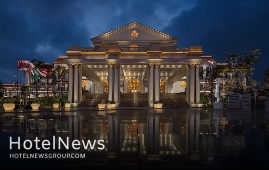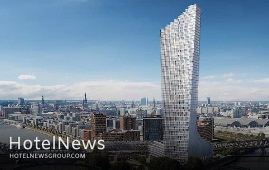
Upon their completion in the near future, these hotels will bring a significant change to the tourism industry in the central Iranian province, the provincial tourism chief has said. The official briefed on one of the accommodation projects, as an example, saying: “An investment of 2.6 trillion rials (about $62 million at the official exchange rate of 42,000 rials per dollar) has been made in the Zaferanieh Hotel, one of the under-construction projects,” the official added. “Covering an area of 1,500 square meters, the project is expected to generate 80 job opportunities directly,” he stated. “The hotel will have 90 rooms and will add 200 beds to the hospitality sector of the province,” he noted. The second-holiest city of the country after Mashhad, Qom is home to both the magnificent shrine of Hazrat-e Masumeh (SA) and the major religious madrasas (schools). Apart from sightseers and pilgrims who visit Qom to pay homage at the holy shrine, the city is also a top destination for Shiite scholars and students who come from across the world to learn Islamic studies at its madrasas and browse through eminent religious bookshops. The antiquity of Qom goes back to the Sassanid era (224 CE–651) and several historical mosques, mansions, and natural sceneries have been scattered across the city as well as towns and villages nearby.
Create: Jun 23, 2021 Edit: Jun 23, 2021 Regional News
A select of Iranian travel-associated businesses and tour operators will promote handicrafts, traditions, and tourism potentials of the country at the 42nd FITUR tourism trade fair, which will be held in Madrid, Spain, from January 19 to 23, 2022. The Touring & Automobile Club of the Islamic Republic of Iran (TACI) as the representative of the Ministry of Cultural Heritage, Tourism and Handicrafts will be organizing Iran paravian at the tourism trade show, Mehr reported. A variety of exhibits, live performances, meetings, and workshops are amongst lineups of the Iranian exhibitors at FITUR 2022, which connects the industry with the inbound and outbound international markets. After hosting a post-pandemic recovery edition in the Spring of 2021, FITUR Madrid 2022 will resume its regular appointments at the beginning of the year, taking place at IFEMA – Feria de Madrid. Over the five days of the international tourism fair, professional participants will have access to unmissable commercial and business activities. In addition to being able to present their offers directly to the end customer, exhibitors can meet with over 150,000 trade visitors with significant purchasing power, according to organizers.
Create: Jun 19, 2021 Edit: Jun 19, 2021 Regional News
International tourist arrivals were down 83% in the first quarter of 2021 as widespread travel restrictions remained in place. However, the UNWTO Confidence Index shows signs of a slow uptick in confidence. Between January and March 2021 destinations around the world welcomed 180 million fewer international arrivals compared to the first quarter of last year. Asia and the Pacific continued to suffer the lowest levels of activity with a 94% drop in international arrivals over the three-month period. Europe recorded the second largest decline with -83%, followed by Africa (-81%), the Middle East (-78%) and the Americas (-71%). This all follows on from the 73% fall in worldwide international tourist arrivals recorded in 2020, making it the worst year on record for the sector. Lack of coordination harms RestartTourism UNWTO Secretary-General Zurab Pololikashvili comments: “There is significant pent-up demand and we see confidence slowly returning. Vaccinations will be key for recovery, but we must improve coordination and communication while making testing easier and more affordable if we want to see a rebound for the summer season in the northern hemisphere.” Vaccinations will be key for recovery, but we must improve coordination and communication while making testing easier and more affordable if we want to see a rebound for the summer season in the northern hemisphere. The latest survey of the UNWTO Panel of Tourism Experts shows prospects for the May-August period improving slightly. Alongside this, the pace of the vaccination rollout in some key source markets as well as policies to restart tourism safely, most notably the EU Digital Green Certificate, have boosted hopes for a rebound in some of these markets. Overall, 60% expect a rebound in international tourism only in 2022, up from 50% in the January 2021 survey. The remaining 40% see a potential rebound in 2021, though this is down slightly from the percentage in January. Nearly half of the experts do not see a return to 2019 international tourism levels before 2024 or later, while the percentage of respondents indicating a return to pre-pandemic levels in 2023 has somewhat decreased (37%), when compared to the January survey.
Create: Jun 16, 2021 Edit: Jun 16, 2021 International News
AC Hotel by Marriott Maui Wailea officially opens its doors today as the newest hotel and the first property in the Hawaiian Islands for the design-driven AC Hotels lifestyle brand. Part of Marriott Bonvoy’s portfolio of 30 extraordinary brands, the hotel marks a significant milestone in delivering an effortless travel experience that strikes the perfect balance between everything you need, and nothing you don’t, in the stunning leisure destination of Maui. Nestled on three acres on the sunny southwestern coastline, AC Hotel by Marriott Maui Wailea features 110 guestrooms with 12 suites, and an infinity-edge pool with a hot tub and cabanas. The hotel offers a perfectly curated experience, focused on the meaningful details and services that enhance every guest’s stay, allowing them to recharge and focus on the beauty of the island. “Our new hotel seamlessly blends the AC brand’s signature amenities with Maui’s naturally-inspiring landscape, people and aesthetics,” says Kaleo Kenui, Dual General Manager for AC Hotel by Marriott Maui Wailea and Residence Inn Maui Wailea. “The overall design is an artistic rendition based on genuine Hawaiian experiences blending with modern life and a recognition of the diverse cultures forming Maui’s remarkable melting pot of humanity.” Large glass panels depicting ocean waves are illuminated at the main entrance acknowledging its proximity to the ocean and the important role it plays on the island. The sunken lounge surrounded by natural lava with tatami-styled flooring pattern of lava stone, varieties of tribal necklaces made from different shells, woodwork, prints and elements are curated throughout the hotel, recognizing the cultural influences of Asian and Pacific-Islander communities. Finally, 100 strands of lei made from dried seeds, berries and flowers, varying up to 12-feet in length, are strung into two beautiful tapestries at the lobby honoring the Hawaiian tradition of gifting lei as a symbol of aloha. “While the new hotel offers more options for visitors, it also allows us to continue supporting our local economy by infusing as much locally-produced art, crafts and culinary creations as we can and creating more jobs,” says Kenui. Intimate and modern, AC Hotel by Marriott Maui Wailea presents two al-fresco and versatile dining options: AC Kitchen and KAI. AC Kitchen—framed by floor-to-ceiling windows, presents guests with a blend of international and Hawaiian inspired cuisine; wine, charcuterie, and fromage tastings; and locally curated delicacies for special culinary events. KAI, meaning “sea” or “seaside” in Hawaiian, is the poolside tiki bar featuring a long, rectangular lava stone firepit that brings a warm and cozy experience to the outdoors, complementing the spectacular sunset views of the Pacific Ocean and neighbor islands. The sophisticated, modern guestrooms feature a neutral-palette color scheme, hardwood floors, and sleek and elevated furnishings to create a greater sense of flow and space. Guests will enjoy smart features like ambiance controls to adjust temperature and lighting, plus traditional and USB outlets in all the right places. The rooms feature curated artwork that reflect Maui and offer views of the Pacific Ocean; islands Lanaʻi, Kahoʻolawe and Molokini; and Mount Haleakala. All rooms will have a private lanai, ensuring guests have the outdoor space they deserve to relax in paradise. AC Hotel by Marriott Maui Wailea features additional signature AC public spaces. Designed with an upscale feel and equipped with business center amenities, including a computer work station and printer services, AC Library provides a flexible environment for guests to work and collaborate. For guests looking to maintain their exercise routine while on vacation, AC Fitness Center is open 24 hours a day with the latest fitness equipment including exercise machines, free weights, lifting benches and a stretching area. AC Hotel by Marriott Maui Wailea is within walking distance to Wailea, Ulua, Mōkapu, and Keawakapu beaches and retail centers Wailea Village, Wailea Gateway, and The Shops at Wailea offering 100 shops and galleries combined. Other nearby experiences include more than 40 restaurants and bars, world-class spas, Wailea Tennis Club and Wailea Golf’s three championship courses. AC Hotel by Marriott Maui Wailea will open committed to its guests and team members’ safety. It will follow Marriott International’s Commitment to Clean operating standards and protocols that include enhanced health and safety standards, anchored by the company’s Global Cleanliness Council. These include guest and associate face-covering requirements, social distancing policies, reduced seating capacity for meetings, frequent cleaning of high-touch areas, hand sanitizing stations throughout the hotel and mobile technology.
Create: May 25, 2021 Edit: May 25, 2021 International News
The average of international travels to and from Iran fell by 80 percent during the past Iranian calendar year 1399 (ended on March 20, 2021) from a year earlier. “During this period, 4,343,163 passengers entered the country, which included 3,030,464 Iranian passengers and 512,699 international travelers,” Mehr quoted Arezou Ghaniun, an official with the Islamic Republic of Iran's Customs Administration, as saying on Saturday. “From the beginning of 1399 to the end of it, we saw a significant reduction in passenger traffic to the country or vice versa in land, sea, rail and air borders, which were caused by various coronavirus restrictions.” International tourist arrivals to Iran plunged 72% during the first eight months of the year when compared to 2019, according to data compiled by the World Tourism Organization. Restrictions on travel introduced in response to the COVID-19 pandemic continue to hit global tourism hard, with the latest data from the UNWTO showing a 70% fall in international arrivals for the first eight months of 2020. Iran, however, has experienced different rates of downfall for inbound passengers over the past months. In the first three months of 2020 (January, February, March), the tourism industry of the country recorded negative rates of 90, 92, and 94 percent, respectively, compared to the same period last year, according to the organization. The fall reached 96 and 97 percent in April and May. And in June, a negative 84% was recorded. But the interesting point in the statistics published by the World Tourism Organization is a steep slope of the improvement of Iran’s tourism arrivals during the last two months, as such growth has leaped 35% in July and August. Optimistic forecasts, expect the country would achieve a tourism boom after coronavirus contained, believing its impact would be temporary and short-lived for a country that ranked the third fastest-growing tourism destination in 2019. According to the newest UNWTO Barometer, international arrivals plunged 81% in July and 79% in August, traditionally the two busiest months of the year and the peak of the Northern Hemisphere summer season. The drop until August represents 700 million fewer arrivals compared to the same period in 2019 and translates into a loss of US$ 730 billion in export revenues from international tourism. This is more than eight times the loss experienced on the back of the 2009 global economic and financial crisis. “This unprecedented decline is having dramatic social and economic consequences, and puts millions of jobs and businesses at risk,” warned UNWTO Secretary-General Zurab Pololikashvili. “This underlines the urgent need to safely restart tourism, in a timely and coordinated manner”. UNWTO’s Panel of Experts foresees a rebound in international tourism in the current year, mostly in the third quarter. However, some experts suggest the rebound could occur only in 2022. Travel restrictions are seen as the main barrier standing in the way of the recovery of international tourism, along with slow virus containment and low consumer confidence. The lack of coordinated response among countries to ensure harmonized protocols and coordinated restrictions, as well as the deteriorating economic environment, were also identified by experts as important obstacles for recovery. The Islamic Republic expects to reap a bonanza from its numerous tourist spots such as bazaars, museums, mosques, bridges, bathhouses, madrasas, mausoleums, churches, towers, and mansions, of which 24 being inscribed on the UNESCO World Heritage list. Under the 2025 Tourism Vision Plan, Iran aims to increase the number of tourist arrivals from 4.8 million in 2014 to 20 million in 2025.
Create: May 16, 2021 Edit: May 16, 2021 Regional News
At a time when many of the world’s events continue to be plagued by COVID-19, making plans even a week in advance may seem difficult, much less 10 years into the future. Nearly overnight, the dialogue shifted from “where to for lunch?” to “can you hear me?”. And as hotels emptied out and travel restrictions drag on, many may wonder, where lies the future of hotels? To answer this question, it is first important to recognize that the hotel sector does not exist as an individual silo, but one which forms part of a much wider network: the ecosystem of how we live and work. The cities in which we live today are a reflection of how humans have shaped our environments to fit our social and economic needs. For generations, urban agglomeration had been the standard of cities, and central business districts (CBDs) thrived as we commuted between living in one area and working in another. Accordingly, hotels have typically focused on serving transient international or regional visitors, primarily playing one of two roles: a place to sleep and meet during our business travels, or a place of respite for our leisure getaways. Today, rising interest in (semi-) permanent remote working and a greater desire to live outside of high-density urban areas may signal yet another impending change in the way we live and work. Could deurbanization or decentralization continue on this trajectory – and what would that mean for hotels? In a Cushman & Wakefield webinar, Richard Pickering, Chief Strategy Officer, EMEA and Borivoj Vokrinek, Strategic Advisory and Head of Hospitality Research EMEA from Cushman & Wakefield, traced the paths of how our societies and hotels have evolved, from their very beginnings to where they could be in the future. Blast from the past: The evolution of travel, from immobile to transient lifestyles Since the early days of civilization, the structure of our society has dictated where we lay our heads every night. When humans lived in self-sufficient tribes and settlements, there was no need to travel or sleep anywhere other than in our own beds; while as society progressed, business travel dominated as merchants travelled for trade. And then, with higher disposable incomes, more free time, rising globalization and the internationalisation of trade, there came the birth of mass leisure and business travel. Clearly, humans have become increasingly mobile – and the advancement of technology will only continue to push us towards this trend. Similarly, the role of accommodation providers has also evolved immensely with our changing social and technological landscape. From being a place for shelter and food to becoming a place to meet and then emerging as a provider of experiences, hotels have always evolved alongside our society and the cities in which we live. In today’s context, our ‘social awakening’ has brought rising calls for better work-life balance and a heightened desire to travel and ‘unwind’. To perpetuate this image, hotels have taken on an additional role: a promoter of one’s social status, driven by the growing prevalence of social media. Yet, this evolution will not end there – with our growing mobility, the role of hotels will only continue to expand to meet our transient needs. “There’s no virtual pivot for hotels,” Pickering emphasized. As our society and cities continue to evolve, so will hotels. ‘The variable impact (of COVID-19) on different sectors’ – C&W Webinar Part 1 of 2: Evolution of our cities and what it means for real estate, presented by Richard Pickering. Note: The relative positionings are for illustration purposes only. Swimming against the current – the rise of remote working Our cities of today, however, have been far from perfect, in fact, some may even argue that urbanisation in the developed world has become a myth. “In city centres, centralized demand, when combined with scarce supplies, pushes up rents for businesses as well as housing costs. [Meanwhile,] increasing city sizes means increasing commute times, which reduces free time and worsens pollution – all while our creaking infrastructure amplifies the penalties of distance,” Pickering suggested. It is unsurprising, therefore, to see an increasing number of digital nomads who choose to forego homeownership entirely to traverse the world in search of the much-revered triple-threat ‘office spaces’: stable Wi-Fi, multiple charging points and good coffee. In fact, as Global Workplace Analytics estimates that 25-30% of the workforce will telecommute multiple days a week by the end of 2021, some argue that ‘working from home’ may eventually become ‘work from anywhere’. And with a number of hotels already offering ‘work from hotel’ packages or even subscription services, it is evident that hotels are well-placed to capitalize on this trend. Forward to the future: Super-commuters in a decentralized world. As the idea of remote working with occasional commutes to the workplace gains wider acceptance from both employers and employees, it seems that we are at the tipping point of a new emerging trend: super-commuting. Super-commuters live in one city or country while their office is in another, commuting between the two from time to time – and this will have implications for hotels. “In the future, if more of the workforce is living in remote areas, it is actually likely that they will use hotel accommodation more frequently [for the days that they do travel to the office],” Vokrinek explained. Importantly, increased remote working does not mean a lesser need for meetings and social interactions – rather, the contrary is most likely true. “Not only will employees be living further away and have fewer interactions amongst each other, but clients will also be living outside of cities. So, there would be a need for more structured [and deliberate] meetings, not only on an international scale, but locally and regionally as well – and that will drive demand for meeting facilities in hotels,” Vokrinek suggested. In fact, not only will the role of hotels evolve, but there will likely be a greater need for hotels in the smaller communities that will form in these areas where such super-commuters will typically work from. “Historically, those towns and places were probably mostly residential, with limited [interest from investors] and limited amenities. However, if people will be living in those local hubs on a regular basis and commute less to the central core office, there will be a need for amenities in those local hubs and this will include hotels. Of course, the demand will be softer, so the hotels will probably be smaller. They will need to be more flexible; most likely a hybrid concept within mixed-use developments, [but there will be a need for them”] explained Vokrinek. ‘Hotels within a new eco-system of workspaces’ – C&W Webinar Part 2 of 2: The role of hotels as cities evolve, presented by Borivoj Vokrinek. The who and the why? Towards a new kind of work-life balance Although the notion of such super-commuters forming a considerable proportion of our workforce seems to lie somewhere in the distant future, with the prevalence of low-cost airlines and the advancements of technology, experts speculated, as early as 2014, that there could already be hundreds of thousands of super-commuters worldwide. This decentralization of the workplace is likely to pick up not only because of our increased mobility and higher level of comfort with remote working, but also due to the attractive benefits it may bring to both employees and employers. As Pickering explained, “In a digitally enabled world where distance no longer matters, […] I see a real opportunity for employees to derive labour arbitrage and live a better life” – even taking a small pay cut from a London salary to work from the Greek island of Kefalonia could be well worth the trade-off”. On the flip side, employers may also realize that sourcing the best (and/or cheaper) talent will no longer be bound by geographical borders. And with higher pressure on costs, especially in the short-term, employers too may find themselves increasingly attracted to the lure of allowing super-commuting. The shift, not death of business travel Many soothsayers have begun lamenting the death of business travel, citing the rise of video conferencing and growing realization that not all meetings call for an 8-hour flight and 2-hour layover. However, while the increased usage of video conferencing will undeniably replace some business travel, especially in the short-term, it would be hasty to presume that this would necessarily lead to a significant decline in business travel in the long-term. Rather, as we become increasingly accustomed to living a mobile lifestyle and working remotely, this emerging form of business travel will likely broaden the opportunities for hotels, through catering to the needs of a more decentralized workforce and their clientele. As Vokrinek further suggested, “Some part of the demand will become more regular and predictable, and this will open opportunities for more membership or subscription concepts and increase the importance of loyalty programmes.” Despite the short-term challenges faced by the hotel industry, it is evident that the role of hotels has constantly expanded to meet the new needs of the times – and there is no reason to assume that this time will be any different. Our society is undoubtedly becoming ever more transient, spending more time outside of our homes. But even then, we will still need places to eat, sleep, work and relax. With the rise of remote working, we will likely crave physical interactions and seek places to meet with others more than ever before. Therefore, while the current pandemic has had an indescribable impact on the hotel sector, its long-term implication is that it has catalysed the evolution of how and where we live and work, with hotels destined to play a much bigger role in our increasingly mobile lifestyles and new work ecosystems.
Create: May 6, 2021 Edit: May 6, 2021 Hotel Management
BeyondTV (BTV), a full-service provider of guestroom entertainment services and solutions for the hospitality industry, has announced the successful implementation of its BeyondTV GuestCast streaming solution at the Aemilia Hotel in Bologna, Italy. Installed by LB Sistemi, one of the first LG Business Solutions vendors to receive BeyondTV dealer Certification in the region, BeyondTV GuestCast will ensure that the Aemilia Hotel can securely meet growing industry demands for personalized in-room entertainment. A new 125-room property situated in the heart of Bologna, Aemilia Hotel seeks to provide its guests with the latest in modern amenities and comforts, with guestroom entertainment being no exception. By leveraging BeyondTV’s Certification Program which provides Italian hotels with straightforward access to the company’s technology via LG Business Solutions, Aemilia Hotel can now offer instant compatibility with thousands of mobile-based streaming apps. Engineered specifically to address the unique needs of the hospitality industry, BeyondTV GuestCast significantly allows guests to cast virtually any content of preference from personal devices onto guestroom televisions without ever requesting personal login information. The platform is also designed to be fully compatible with existing hotel television and Wi-Fi network hardware, eliminating the need for complex integrations or equipment replacement. “In the current market environment, it is more important than ever for hotels to enhance their competitiveness by adopting technologies that can safely address guest expectations for personalized experiences,” said Luca Bibolini, General Manager at Aemilia Hotel. “As a modern 4-star hotel, we were committed to identifying the industry’s leading platform for personalized in-room entertainment, with BeyondTV GuestCast offering precisely the kind of flexible functionality, ease-of-use and enhanced security that today’s guests expect.” In addition to sidestepping the need for guests to enter-in sensitive login information, BeyondTV GuestCast also utilizes advanced device isolation capabilities to prevent cross-room communication. This feature significantly prevents both the inadvertent and malicious casting of content to televisions located in other rooms, and serves as yet another vital layer of protecting guest privacy. BeyondTV GuesCast is also backed by 24/7 support services that can swiftly address any suddenly arising performance issues before they can negatively impact hotel stay experiences.
Create: May 6, 2021 Edit: May 6, 2021 International News
Hyatt Hotels Corporation (NYSE:H) today announced the opening of three boutique hotels in Sweden under the JdV by Hyatt brand. Story Hotel Riddargatan and Story Hotel Signalfabriken in Stockholm, and Story Hotel Studio Malmö in Malmö, Sweden– all join Hyatt’s independent collection portfolio, significantly increasing Hyatt’s brand presence in Sweden. The three hotels join Hotell Reisen bringing the total number of Hyatt properties in the country to four. The JdV by Hyatt brand caters to free-spirited guests seeking vibrant and socially inclusive stays – bringing people from all walks of life together through joy-driven services. Deeply rooted in the culture of its local neighborhood, each hotel is as unique as the individuals who enter through its doors, providing guests with a range of locally inspired programming that allows them to connect authentically with the surrounding community during their stay. With modern, Scandinavian design that reflects the edgy nature of both Swedish cities, the hotels offer amenities for business and leisure travelers alike. “We are truly passionate about the neighbourhoods in which our hotels are located – so much so that we ensured the design of each hotel was a true extension of its surroundings and authentically reflected the local culture”, said Alexander Hederstrom, general manager of Story Hotel Riddargatan and Story Hotel Signalfabriken. “This is why we are so proud and excited to be joining JdV by Hyatt – a brand that truly recognizes and celebrates the importance of local community.” “We are excited to welcome guests through our doors and share with them the spectacular views of the ocean and the beautiful city of Malmö from our rooftop. Story Hotel Studio Malmö is at the heart of the city, only a five minute walk from the Malmö Central Station,” said Sebastian Kamieniarczyk, general manager of Story Hotel Studio Malmö. “With each hotel’s unique location, there really is no better place for guests to stay when coming to explore the city and immerse themselves in the local culture”. Story Hotel Riddargatan, Story Hotel Signalfabriken and Story Hotel Studio Malmö all feature individually designed boutique guestrooms, vibrant public spaces and food and beverage offerings for both visitors and residents.
Create: Apr 19, 2021 Edit: Apr 19, 2021 International News
Wyndham Hotels & Resorts (NYSE: WH) – the world’s largest hotel franchising company with over 8,900 hotels across nearly 95 countries and territories – announced today the first groundbreaking of its new La Quinta and Hawthorn Suites dual-brand hotel concept in Pflugerville, Texas. This marks the first-ever pairing of these two flags under the same roof and enables owners to target both the business transient and extended-stay demand within any given market. The company has 36 La Quinta and Hawthorn dual-branded hotels in its development pipeline in markets such as San Antonio and El Paso, Texas; Yuma, Ariz.; Wichita, Kan.; Charlotte, N.C. The property is slated to open in March 2022 with a combined 100 guestrooms – 30 of which will feature the recently updated Hawthorn room design that includes modern, well-equipped kitchens for extended-stay guests. This hotel will also feature the newly refreshed room design from La Quinta’s sought-after Del Sol prototype in 70 rooms. This new dual-brand hotel concept is designed to streamline development and operational costs. The concept includes a shared lobby, spacious modern great room, fitness center, bar, amenities, and back of the house all while appealing to the multiple types of travelers that have an affinity for these brands. The combination enhances Wyndham’s suite of offerings for developers by coupling its leading upper-midscale brand, La Quinta, with its benchmark, extended-stay Hawthorn Suites brand that reported a 44 percent year-over-year increase in domestic contract executions during 2020. Conveniently located at Pflugerville’s Stone Hill Town Center, just 15 miles northeast of Austin, the hotel provides easy access to the area’s more than 1,000 acres of scenic parks, trails and open spaces. The growing suburb of Pflugerville has seen significant business and residential growth, with a nearly 40 percent population increase in the past 10 years. We’re delighted to expand our portfolio with this new dual-branded hotel, providing these two distinct accommodations under one roof to meet the diverse needs of today’s travelers and provide operational efficiencies for developers,” said Krishna Paliwal, Wyndham’s president of La Quinta and head of architecture, design, and construction. “Our powerful marketing and sales programs for both La Quinta and Hawthorn will combine to drive reservations to this hotel. The industry-leading Wyndham Rewards program, now 86 million members strong, drives 46 percent of all U.S. hotel stays across our portfolio.” With La Quinta and Hawthorn Suites targeting different types of travelers, this brand pairing offers a unique opportunity to introduce a new subset of consumers to Wyndham’s strong upper-midscale and midscale portfolio. By bringing select-service and long-term lodging together under one roof, Wyndham is tapping into the steady and strong appetite developers and travelers have for extended-stay, especially in the midscale space which is expected to continue the high growth that it is seeing today.
Create: Mar 6, 2021 Edit: Mar 6, 2021 International News
St. Regis Hotels and Resorts (www.StRegis.com), part of Marriott International (www.Marriott.com), today announced the opening of The St. Regis Almasa with the rebranding of the Almasa Hotel. Located in the New Administrative Capital of Egypt, The St. Regis Almasa is poised to become the best address in the heart of the up-and-coming city, which is slated to be the new face of Cairo and the administrative and financial hub of Egypt. “We are delighted to bring our iconic St. Regis brand to the New Administrative Capital together with the National Authority for Management & Investment,” said Guido De Wilde, Chief Operating Officer, Middle East, Marriott International. “This opening is a significant milestone in our journey and underscores the tremendous trust and confidence our owners have in us and in the power of our luxury brands in the region.” General Sherif Salah El-Din Chairman of The National Authority for Management & Investment said, “The National Authority for Management and Investment is excited to collaborate with Marriott International to bring the classic sophistication of the St. Regis brand to the New Administrative Capital of Egypt. The St. Regis Almasa will play a significant role in giving the tourism industry much-needed support and will become the new destination for luxury hospitality in Egypt, playing host to the country’s most coveted events, conferences and summits.” Showcasing timeless design and exquisite architecture, The St. Regis Almasa offers 270 rooms, 90 suites, 60 apartments and 14 villas, all featuring a private balcony or patio overlooking the pool and surrounding lush green landscape. The hotel’s classic aesthetic blends effortlessly with an elegant palate of rich fabrics to create a refined environment of luxury and comfort. Guests will enjoy the brand’s signature Butler Service, which offers around-the-clock anticipatory service and customizes each guest’s stay according to their tastes and preferences. The St. Regis Almasa boasts a 42,000-square-foot convention center that hosts official government conventions and events, as well as official foreign presidents’ and delegation visits. The Convention Center includes three ballrooms with separate entrances, dedicated bridal suites, nine meeting rooms and six VIP lounges with access to a private restaurant. It also features The Summit Hall, which is renowned for hosting heads of states, and Teatro Al Asema, a state-of-the-art spectator venue. The hotel is also ideally situated a short distance from Egypt’s ministerial district and the new Arts and Culture hub which is home to the Grand Opera House, Egypt’s Capitals Museum and the Capital Library. Dining venues at The St. Regis Almasa include La Sponda, offering true Italian charm and flavor, and Café Royal situated in the heart of the lobby serving the St. Regis brand’s signature Afternoon Tea ritual. The hotel also anticipates introducing new concepts and distinctive culinary experiences. The St. Regis Almasa’s leisure facilities cater to all ages, featuring indoor and outdoor swimming pools and an artificial beach with waves. Guests can escape to the Trio Club House, an exquisite retreat housing a luxurious spa. The spa has eight tranquil treatment rooms offering a range of holistic treatments, a Moroccan Hammam, sauna and steam rooms and a fitness center with a separate space for ladies and a kids club. True to the legacy of the iconic brand, The St. Regis Almasa is expected to encompass the hallmarks of the brand such as its rich traditions and rituals to bring to life a complete brand experience over the next few months.
Create: Mar 6, 2021 Edit: Mar 6, 2021 International News
The Iranian government has paid 6.5 trillion rials ($154.7 million at the official exchange rate of 42,000 rials per dollar) in loans to the tourism businesses affected by the coronavirus pandemic across the country in the current Iranian year 1399 (started on March 20, 2020), the tourism minister has said. Although the coronavirus outbreak has caused significant damage to the tourism industry, one of the ministry’s strategic plans is to diversify tourism products, which is expected to expand economic prosperity, Ali-Asghar Mounesan announced on Monday. Several historical structures and aging buildings have been revived and repurposed into different accommodation centers to attract more domestic and foreign travelers, he added. In recent years, nature tourism has also gained popularity due to the country’s natural beauty and attractions, he explained. In this regard, several eco-lodge units have been established even in the farthest regions of the country as well, the minister noted. Elsewhere in his remarks, he expressed hope that limited Noruz trips would be possible, if practiced under health protocols, during the Iranian New Year vacations, which begins on March 21. Government’s care and support packages Last October, the deputy tourism chief, Vali Teymouri, announced that a new support package was approved to pay loans to businesses affected by the coronavirus pandemic. Depending on the type and activity of the businesses, they could benefit from at least 160 million rials ($3,800 at the official rate of 42,000 rials) to nine billion rials ($214,000) of bank loans with a 12-percent interest rate, he said. The loans would be allocated to tourist guides, travel agencies, tourism transport companies, tourism educational institutions, eco-lodges and traditional accommodations, hotels, apartment hotels, motels, and guesthouses as well as traditional accommodation centers, tourism complexes, and recreational centers, the official explained. Teymouri in September pointed to the 1.3 million tourism workers in the country, who are facing several issues due to the coronavirus crisis and said “This number, in addition to their households, includes a significant population that makes a living through tourism, who are needed to be considered in ministry’s decisions.” Back in August, Teymouri announced that the tourism ministry had approved a total budget of 4,920 billion rials (over $117 million) to support corona-affected tourism businesses, covering as much as 36,000 people working in the tourism sector. Tourism industry in critical situation Mounesan in October warned that Iran’s cultural heritage and tourism would be in a critical situation if the crises caused by the outbreak of the coronavirus continue. Last August, the tourism minister said that the tourism sector of the Islamic Republic had suffered a loss of 12 trillion rials (some $2.85 billion) since the outbreak of the coronavirus pandemic. He also noted that the coronavirus pandemic should not bring traveling to a complete standstill. “Corona is a fact, but can the virus stop tourism? Certainly not. For us, the coronavirus is a new experience in dealing with crises that teaches tourism experts around the world how to deal with such a disaster, and thankfully governments are turning this into an opportunity for better planning.” Optimistic forecasts, however, expect Iran to achieve a tourism boom after coronavirus contained, believing its impact would be temporary and short-lived for a country that ranked the third fastest-growing tourism destination in 2019. The latest available data show eight million tourists visited the Islamic Republic during the first ten months of the past Iranian calendar year (started March 21, 2019).
Create: Mar 3, 2021 Edit: Mar 3, 2021 Regional News
Nobu Hospitality, the global lifestyle brand founded by Nobu Matsuhisa, Robert De Niro and Meir Teper, is delighted to announce its continuing global expansion into the “Gate to the World,” Hamburg, Germany. “We are very happy to be working with SIGNA in developing the Nobu Hotel in the great city of Hamburg,” stated Robert De Niro and Chef Nobu Matsuhisa, Founders of Nobu Hospitality. The Nobu Hotel and Restaurant will be located within the Elbtower, a project by SIGNA Real Estate, one of Europe’s leading property companies. The Elbtower will be a mixed-use development destination encompassing premium office space and the Nobu Hotel and Restaurant set within the tallest high-rise in the city. Timo Herzberg, CEO SIGNA Real Estate Germany remarks, “The partnership with Nobu Hospitality in the launch of the Nobu Hotel and Restaurant Hamburg underscores the compelling Elbtower development as Northern Germany’s tallest skyscraper. Hamburg as a destination fits seamlessly within the Nobu Hotel and Restaurant collection and will be embraced by our prestigious office tenants in the Elbtower as the most exclusive destination in Hamburg.” Trevor Horwell, CEO Nobu Hospitality comments, “We are extremely honoured and excited to be working with SIGNA on this unique project. This is the first project in this growing partnership, and we are exploring other destinations with SIGNA. Hamburg is an economic powerhouse in Germany and is an exciting destination for travellers whether for business or pleasure and perfectly fits with our global clientele. The Elbtower itself is a very special project planned as Hamburg’s world class dynamic lifestyle destination with our Nobu Hotel and Restaurant sitting as its core.” Rising 245m and 64 stories over the River Elbe, the Elbtower is designed by celebrated architectural firm, David Chipperfield Architects, and will complete the city’s silhouette with its striking and curved façade. Forming a designed counterpoint to the famed Elbphilharmonie concert hall and serving as an entrance marker to the prestigious HafenCity district. The Elbtower will house the Nobu Hotel and Restaurant, the tower itself will be comprised of flexibly designed office spaces with unparalleled views of the city and beyond. The ground floors, with their innovative layouts, will form the hub of the Elbtower community and play a significant role in positioning the Elbtower as the most attractive place to work, sleep, eat and drink, shop and socialise in Hamburg. The offering will comprise of a variety of retail shops, restaurants, and co-working spaces. The Elbtower will add to The SIGNA Group’s portfolio of exclusive real estate properties in prime city locations around Europe. The Nobu Hotel Elbtower Hamburg will offer 191 spaciously designed guest rooms and suites, a 200-seat Nobu restaurant, a stylish terrace bar and lounge with views of the River Elbe, and a state-of-the-art fitness and wellness facility. In addition to the restaurant and private dining rooms, the hotel will offer sophisticated event space for corporate and social gatherings as well as an outdoor terrace. Another highlight will be a Nobu private members club for the local community where members will benefit from a private lounge with a food and beverage offering, access to the hotel’s fitness and wellness facility as well as exclusive members only events. Nobu is one of the world’s most celebrated luxury hospitality brands renowned for its award-winning “new style” Japanese cuisine and exceptional hotel offerings in the world’s most desirable locales, with heartfelt service, energized public spaces and instinctive design.
Create: Feb 26, 2021 Edit: Feb 26, 2021 International News
